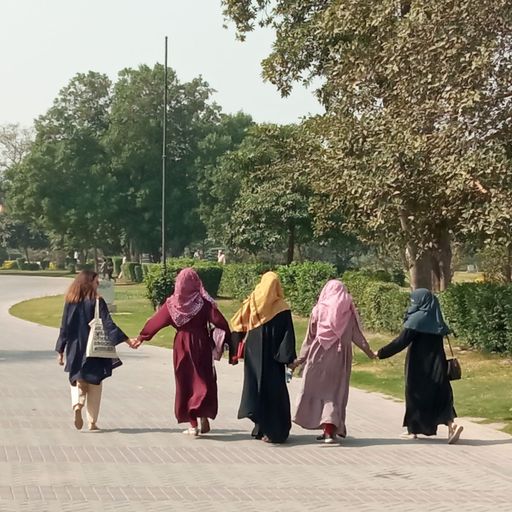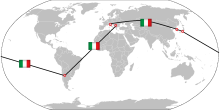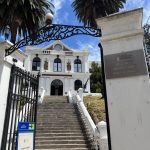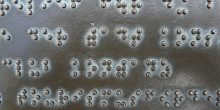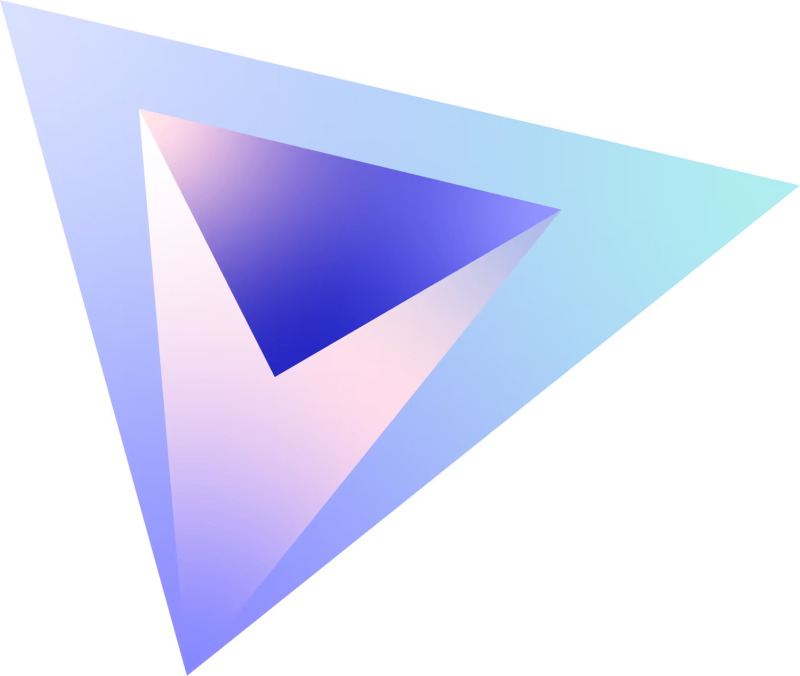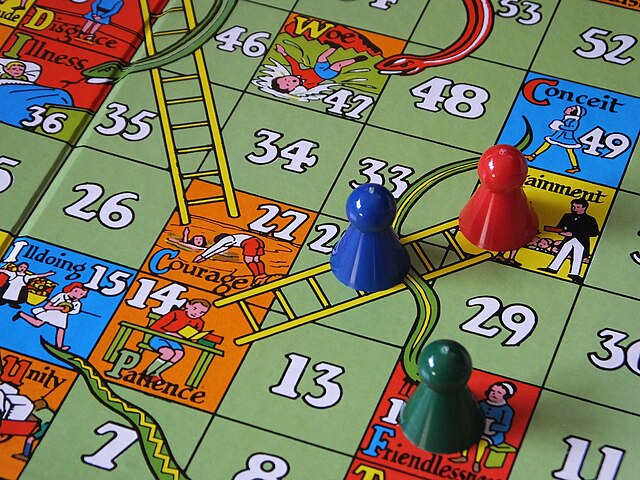I have the privilege to use mathematics as a way to explore amazing corners of the world and meet wonderful people. I recently went for two weeks to Lahore, in Pakistan, and from there directly to Ghana for a week.
The reason for my trip to Pakistan was to teach part of the Abstract Algebra course in the International Mathematics Master (IMM), a programme I have been involved with for the last couple of years. I taught an intensive mini-course on Group theory and the Rubik’s cube together with Giovanni Placini, a colleague from the University of Florence.
We were really looking forward to this trip since we knew already many students from previous online interactions last year when we taught the Linear Algebra course on Zoom. I was particularly excited to finally meet a student from Nigeria I had supervised for an online mentorship scheme for African students back in the summer of 2021. The excitement was shared by the students since we were the first lecturers who visited in person after the pandemic. So there was a sense of real joy in our first meeting!
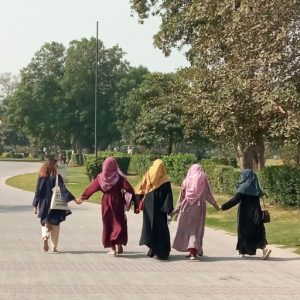
Organizing the teaching in a program where all the faculty comes from abroad for a short amount of time is not an easy task. We tried to maintain a balance between the topics we wanted to cover and the actual material that we could reasonably expect the class to learn in a short amount of time. The idea of using the Rubik’s cube as fil rouge of the course worked well and helped the students to digest abstract notions such as group actions and the order of an element in a group.
We were teaching every day with exercises sessions every afternoon and, of course, there are challenges in keeping up with such an intense rhythm. I think that we should experiment a bit more with a hybrid set-up where we start the course a few weeks prior to the visit with some online lectures. Luckily there were two tutors, Daan van de Weem and Sohaib Khalid, who covered some preliminary material both for the Algebra and the Real Analysis course. We also quickly realised that the students needed some training also in some ‘soft mathematical skills’ such as academic writing, LaTeX, and how to present mathematics arguments effectively. In the second week, we organised some group presentations with some feedback sessions afterward (inspired by the set-up of the master seminar in Amsterdam) and it was an important exercise for the students to start approaching the material independently and to practise their communication skills.
On the last day, we arranged a professional development session where we discussed the application process for further opportunities abroad. I hope it was a useful moment for the students but I was left with the doubt that we had planned the session exactly as we would have done in Europe and we should have instead focused more on the cultural and societal context of our class. We concluded with a screening of the documentary  Secrets of the surface
Secrets of the surface dedicated to the life and work of Maryam Mirzakhani. It was a very enjoyable moment that was appreciated by all the students, who got really inspired by the story of a woman mathematician coming from a culture similar to their own.
dedicated to the life and work of Maryam Mirzakhani. It was a very enjoyable moment that was appreciated by all the students, who got really inspired by the story of a woman mathematician coming from a culture similar to their own.
We shared many social moments, from dinners to trips to the local market, the visit to Badshahi Mosque, and even the wedding of the brother of one of our students who invited the whole class. It was an amazing teaching experience and I think I never bonded so much with a group of students. I had four female students, we met as strangers with very different life experiences as women and mathematicians but we got particularly close and I am missing all of them already. One of them asked me what was the first thing that had excited me about mathematics and I got animated describing to her my first love for non-Euclidean geometry. It was truly special to see the sparkles in her eyes when she was sharing my excitement.
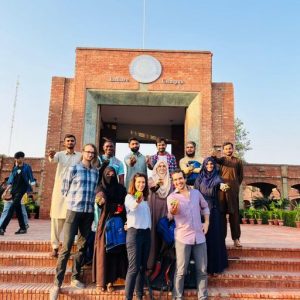
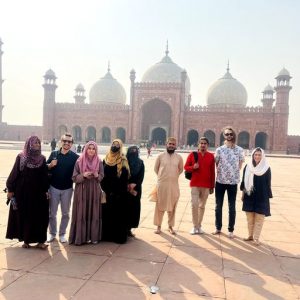
I passed from Biryani to Jollof rice directly, arriving in Ghana physically and emotionally exhausted from the Pakistani experience but still with enough energy and curiosity to explore a new African country. I spent the first couple of days visiting the mathematics department at the University of Cape Coast, located on the ocean in the capital of the Central Region of Ghana.
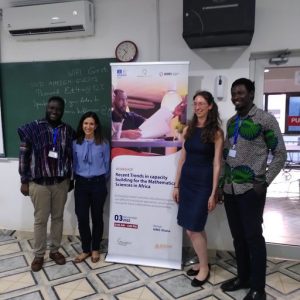
The Head of Department shared the challenges of having to teach undergraduate classes with literally a thousand students and very limited staff, leaving little energy and resources for research. They are struggling in particular with teaching Algebra and Geometry. I hope there will be opportunities to come back with a small team to support them in teaching these subjects, especially at the graduate level. My host had organised a small radio interview where I discussed the problem of gender balance in mathematics and I was really honoured to share a bit of my personal journey.
In the second part of the week, I visited the African Institute of Mathematical Sciences (AIMS) Ghana, where I co-organised a workshop on research capacity building together with some colleagues: Franca Hoffmann, Bernard Bainson, and Francis Torgbor. The event was a great occasion to meet and interact with mathematicians coming from all over the country and learn a bit more about the mathematical situation in Ghana with its challenges and opportunities. The discussions during the day highlighted the necessity of having a stronger interdepartmental network to share resources and responsibilities concerning teaching, student supervision, financial opportunities, and scholarships information.
There is a plan to create a Ghana National Association of Mathematicians and hopefully, it will become a reality in the coming years. Moreover, the huge number of undergraduate students creates the need for technological tools supporting teaching and assessment. There are successful experiments using STACK (the System for Teaching and Assessment using a Computer algebra Kernel) and many participants are looking forward to learning more about this new assessment method.
On Friday, I concluded my trip with a visit to the mathematics department at the University of Ghana. The main challenge that the local colleagues described was the difficulty of attracting new lecturers. At the moment several of their undergraduate students manage to secure postgraduate opportunities abroad, but very few of them decide to come back to Ghanaian University due to the scientific isolation and the not very competitive working conditions. All the people I met were very scared by the current economic crisis and the rampant inflation that is devaluating the local currency.
Despite all the challenges that mathematicians in Ghana, and Africa in general, are facing, I was impressed by the energy and determination of the students and professors I met. The huge number of young minds (by 2050, as much as 40-45% of youths under 25 will be African) for sure provides a great opportunity for training and development.
I came back to Europe full of energy, ideas for future collaborations, and soul-filling memories. Reflecting back I think that privilege, and its partial ordering, has been a keyword of my journey and it will give me food for thought for the coming months.

